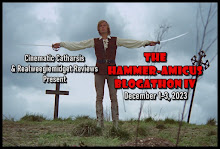I am very happy to announce a guest post by Camiele White for HAMMER AND BEYOND. Her company is behind the recently announced $1000 Horror Scholarship.
Article writer by day, renegade poet by night, Camiele White loves any and everything film. She chases only the original (or incredibly funny) and has been known to talk for hours about subjects that most people just don’t care about. Right now, she gets her jabberjaw jollies writing about Halloween costumes. If you want to give her a buzz, she can be reached at cmlewhite at gmail.com.
Since visiting the Hammer Horror blog I’ve become emphatically interested in British horror films, particularly those of the Amicus Productions family in the late 60s and early 70s. The acting of the time is about the same whether in London or Hollywood; however, what it lacks in fantastic thespianism it more than compensates for in plot and atmosphere.
A subject that has been of great interest to me for the past six or seven years has been the subconscious mind --those things that we keep lurking in the underbelly of our imaginations. Whether in dream states or daytime visions, what we do in life and what we act out in our fantasies come ever closer the further we attempt to push them apart. In the films of Amicus Productions, there seems to be an obsession with dream states and intricate complications of the subconscious. Taking an in-depth and unbiased look into the raw mind shows Amicus as a studio incredibly ahead of its time in terms of subject matter.
There also seems to be a preoccupation with the internal battle between good and evil prevalent throughout many of the films Amicus produced in the 60s and 70s. The title of one film in particular caught my attention. 1967s
The Torture Garden immediately entices the audience to explore the “primordial monstrosities that lurk beneath the surface of the mind”: raw, unadulterated, and purest evil.
I usually have an aversion to films that preach to me--especially horror films. However, the manner in which
The Torture Garden managed to convey a message is the stuff of craft and cleverness. In that respect, I have no choice but to taut the film for the balls it took to force viewers to come face to face with the wickedness of their own souls.
We are first confronted with a carnival scene --always a good sign that a horror film is going to be worth watching as the era of carnie films seems to have come and gone. We meet five strangers who are enticed to enter into what is called, aptly, the Torture Garden. When the initial carnival frights have ended, the curator of this den human evil, Dr. Diablo, entices the guests further on for a fiver. As it is, each guest egged the next on, to see who truly had the guts to delve deeper into the devil’s nightmare. They are confronted by Atropos --a goddess who holds the scissors of fate in one hand and five bits of string in the other. Each string she holds belongs to one of the five guests. As they step up to the wax figure, each is instructed to look deep into her mystic scissors.
There’s the money hungry nephew of a dying rich recluse, Colin Williams; an American starlet starved for the secret to eternal fame, Carla Hayes; Carla’s cousin and obsessive wife of a world renowned pianist, Dorothy Endicott; and the mad collector of everything Edgar Allan Poe, Ronald Wyatt. Each of them has an inner beast which Atropos exposes to them in their most monstrous forms. Colin allows his uncle to die in front of him to locate his secret treasure; Carla’s unyielding ambition allows her to sabotage her flatmate’s date with an influential producer; Dorothy’s obsession with a world renowned pianist isolates him from the world; and Ronald’s thirst for the absolute Poe collection drives him to kill a fellow collector. Each has their turn with Atropos; each is confronted with their ultimate demise: death by bloodthirsty cat, transformation into a living doll, murder by a piano, and burning alive, respectively
With a snip of the scissors, the guests and the audience are brought back to their living reality.
It’s the mastery and thrill of the mortal end that’s so stunning in
The Torture Garden. The feats of lighting and shadow pull this film into a nether realm of photography --bringing grace and beauty to the prospect of death. What director, Freddie Francis, and producer, Milton Subotsky, so cleverly convey is the twisted nature of the human psyche. The brilliant interweaving of short stories into one cohesive narrative opens the spectrum of what the audience is able to conceive within themselves --no one is safe from the tortures of the mind. Without forcing dialogue, relying solely on the atmosphere of certain types of lighting, the audience is dragged into its own subconscious and each member is forced to reconcile his dirtiest desires with his walking live.
It’s a marvel worthy of a carnival crowd: the freakshow that is the devil within all of us. What we see when we look inside this trick mirror is nothing short of the horrors that we hope no one else is privy to. When you take your walk through the Torture Garden, what nightmares of your personality will you be confronted with?




























